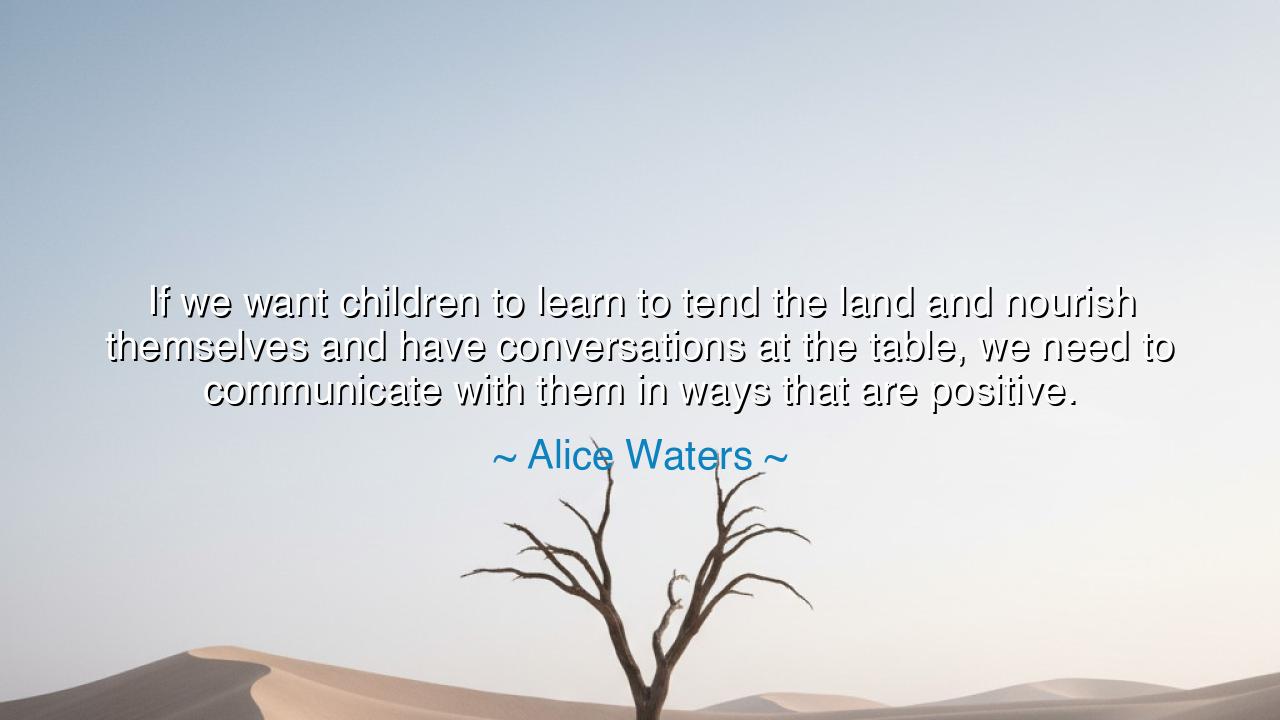
If we want children to learn to tend the land and nourish
If we want children to learn to tend the land and nourish themselves and have conversations at the table, we need to communicate with them in ways that are positive.






Alice Waters, priestess of the table and steward of the soil, once declared: “If we want children to learn to tend the land and nourish themselves and have conversations at the table, we need to communicate with them in ways that are positive.” In this saying lies not only a philosophy of food, but a philosophy of life. For she ties together three sacred acts—tending the land, nourishing the body, and sharing at the table—and teaches that these must be passed on with gentleness and joy if they are to endure.
The essence of her wisdom is this: lessons taught with positivity take root more deeply than those taught with fear or scorn. A child who is encouraged to plant seeds with delight will grow to cherish the earth; a child who is invited to share food in warmth will grow to honor fellowship. Waters reminds us that the way we communicate shapes not only knowledge but the soul itself. Harsh words may command obedience, but loving words cultivate reverence.
History offers us mirrors of this truth. In ancient Greece, the philosopher Plato spoke of the symposium—meals shared not merely for sustenance, but as occasions for dialogue, for the nurturing of both body and mind. At these tables, guided by wise mentors, young men learned not only rhetoric but also respect, patience, and community. So too does Alice Waters call us to see the table as sacred ground where lessons of humanity are sown.
Her words also rebuke a culture that has too often severed children from the sources of their life. To eat without knowing the earth, to speak without listening, to live without gratitude—these are the marks of forgetfulness. By urging us to teach with positivity, Waters seeks to restore memory: that food comes from soil, that nourishment comes from care, and that conversation is as vital as bread.
Let this teaching be carried forward: if we wish to raise a generation that loves the earth and honors one another, we must plant in them seeds of joy, not fear. To tend the land, to nourish the body, to share the table—these are acts not merely of survival but of civilization. As Alice Waters teaches, let us guide our children with light, that they may one day guide the world with wisdom.






LTLan Tran
Alice Waters’ quote about teaching children through positive communication is inspiring. It underscores the importance of not only teaching skills like tending to the land but also creating an open, supportive atmosphere for discussions. But how can we make sure that positive communication isn’t just about speaking kindly, but also about creating an environment where children feel comfortable expressing their thoughts and emotions, even if they’re difficult or uncomfortable?
NANgo An
I love the idea of communicating with children in a positive way to encourage meaningful conversations and life skills. But can positive communication truly make a difference in a child’s ability to learn and grow, especially if external factors—like the environment they live in or access to resources—aren’t as supportive? Does positive communication alone work, or should it be combined with broader efforts to improve a child’s access to education and nourishment?
MNMan Nghi
This quote really highlights the importance of creating a nurturing environment for children to learn and grow. If we want children to develop a strong connection with the land and themselves, as well as cultivate meaningful conversations, positive communication is key. But how do we strike a balance between being positive and being honest when children need to understand difficult concepts or challenges in life? Is there a place for constructive criticism in this framework?
HDHoang Duy
Alice Waters’ insight about communication with children is incredibly important. We often focus so much on what children are learning in schools or extracurricular activities, but how we communicate with them at home plays an equally crucial role. Shouldn’t we also be focusing on fostering positive communication in all aspects of a child’s life, from school to family interactions? How can we ensure that positive communication becomes the foundation of every conversation?